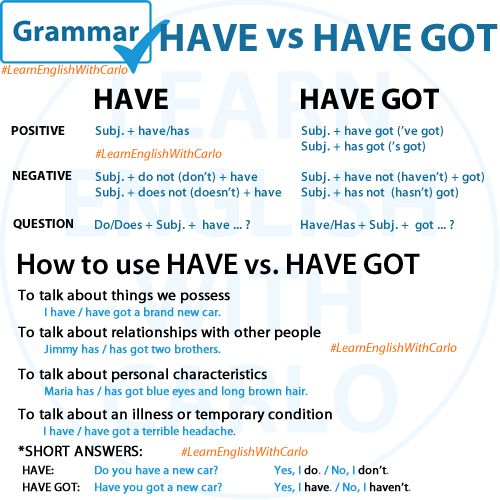When we talk about possession, relationships, illnesses, or characteristics, English gives us two ways to express the same idea:
👉 HAVE and HAVE GOT
Both mean the same thing, but they’re used slightly differently in everyday English.
🧩 1. Meaning and Usage
Both HAVE and HAVE GOT are used to talk about things we own, relationships, personal characteristics, or temporary states like illnesses.
✅ They mean exactly the same thing.
✅ Both are present tense forms.
✅ HAVE GOT is not the present perfect of “get.”
❌ I have got my keys. → This does not mean “I have obtained my keys.”
✅ It means “I have my keys.” (possession)
💡 Tip:
- HAVE is used more in American English and formal contexts.
- HAVE GOT is more common in British English and informal conversation.
💼 2. Talking About Possession
We use have / have got to show ownership or possession.
✅ Examples:
- I have / have got a brand new car.
- She has / has got a big house near the beach.
- They have / have got a lot of free time today.
💬 Both are correct — the difference is mainly in style and formality.
👨👩👧 3. Talking About Relationships
Use have / have got to describe family members or relationships.
✅ Examples:
- Jimmy has / has got two brothers.
- I have / have got a lot of friends at school.
- We have / have got a great teacher!
Again, both versions are natural and correct.
🌈 4. Talking About Characteristics
We also use have / have got for describing personal features or qualities.
✅ Examples:
- Maria has / has got blue eyes and long brown hair.
- My dog has / has got short legs and a loud bark.
- The house has / has got a big garden.
🤒 5. Talking About Illnesses and Temporary Conditions
We use have / have got to describe feeling sick or having a temporary condition.
✅ Examples:
- I have / have got a terrible headache.
- He has / has got a cold.
- She has / has got the flu this week.
🧠 6. Making Questions and Negatives
Here’s where things get interesting!
The grammar structure changes depending on which one you use.
✅ With HAVE
We use do / does to make questions and negatives.
Questions:
- Do you have a car?
- Does she have any siblings?
Negatives:
- I don’t have a car.
- She doesn’t have any siblings.
Short answers:
- Yes, I do. / No, I don’t.
✅ With HAVE GOT
We use have / has directly — no “do” needed.
Questions:
- Have you got a car?
- Has she got any siblings?
Negatives:
- I haven’t got a car.
- She hasn’t got any siblings.
Short answers:
- Yes, I have. / No, I haven’t.
⚖️ 7. Quick Comparison Table
| Function | HAVE | HAVE GOT |
|---|---|---|
| Formality | Neutral / Formal | Informal / Conversational |
| Use | American & International English | British & Informal English |
| Question Form | Do you have…? | Have you got…? |
| Negative Form | I don’t have… | I haven’t got… |
| Short Answer | Yes, I do. / No, I don’t. | Yes, I have. / No, I haven’t. |
💬 8. Common Mistakes to Avoid
❌ I’ve got not a car.
✅ I haven’t got a car.
❌ Do you have got a car?
✅ Do you have a car? / Have you got a car?
💡 Remember: never mix “do” with “have got.” Choose one structure and stay consistent.
✍️ 9. Practice Time!
Try completing these sentences with have or have got:
- I _______ two sisters.
- _______ you _______ a pen I can borrow?
- He _______ a terrible headache today.
- They _______ a beautiful apartment.
(Answers: 1. have / have got, 2. Have you got / Do you have, 3. has / has got, 4. have / have got)
🎯 In Summary
Both HAVE and HAVE GOT mean the same thing — the difference is style and form.
Use HAVE for more formal or American contexts, and HAVE GOT for more informal or British ones.
With this simple guide, you’ll never mix them up again!

